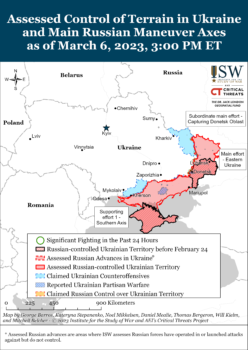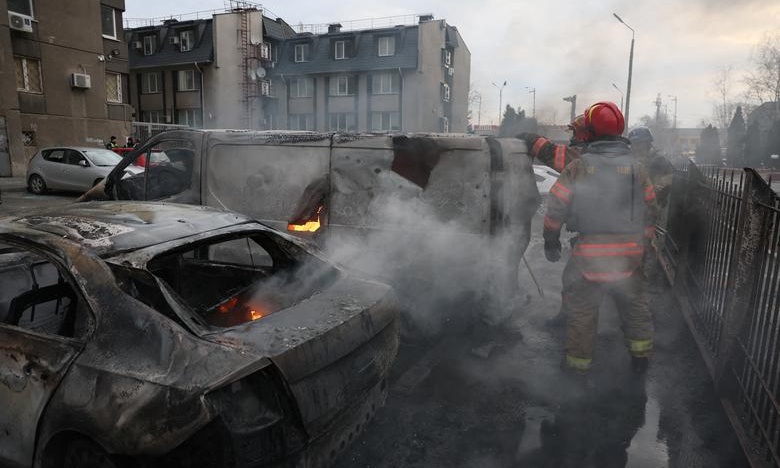Aftermath of a Russian missile strike on Kyiv, Ukraine, March 9, 2023 (Gleb Garanich/Reuters)
Thursday’s Coverage: Another Wave of Russian Missile Strikes

Map: Institute for the Study of War
UPDATE 0744 GMT:
Power and water have been restored in Kyiv, but 30% of houses are still without heating.
Only a few communities in the Kharkiv region have no electricity, but there may be outages during the day.
UPDATE 0723 GMT:
Russia’s Sberbank has announced a drop of 78.3% in profits in 2022.
The net profit fell to 270.5 billion rubles ($3.56 billion).
“2022 has been an extremely difficult year for the Russian economy and the Russian banking sector,” said Sberbank CEO Herman Gref. He noted that “a number of countries imposed blocking sanctions” against Russia’s “largest companies”, including the bank.
UPDATE 0715 GMT:
Turkey’s customs officials have halted the transit of sanctioned goods bound for Russia through Turkish territory, reports Russia’s Kommersant FM radio station.
Kommersant cited Russian logistics operators for the claim of the sudden stoppage. Turkey has been a key route for Russia’s sanction-busting efforts.
The US and European countries have been pressing Ankara to halt the movement of the goods.
In June, Vladimir Putin authorized a “parallel import” scheme, which exempted sanctioned goods from import duties.
Two months later, Turkey reported an all-time monthly record of more than $738 million in exports to Russia.
ORIGINAL ENTRY: Responding to Russia’s latest wave of missile strikes, which killed at least six civilians on Thursday, Ukraine President Volodymyr Zelenskiy has assured:
No matter how treacherous Russia’s actions are, our state and people will not be in chains. Neither missiles nor Russian atrocities will help them.
The six victims were in a residential area in in the Zolochiv district in the Lviv region in western Ukraine. Fire destroyed three residential buildings, three cars, a garage, and several outbuildings.
In addition, four people were slain by a Russian shell which hit a bus stop in Kherson city in southern Ukraine.
The Ukraine Air Force said 95 missiles were launched, of which 34 were downed. The interception rate was relatively low, compared to the 17 other Russian waves since October 10, because “the armed forces of Ukraine do not have means capable of destroying Kh-22 and Kh-47 ‘Kinzhal’ and S-300 [missiles]”
At least 21 Kh-22, Kh-47, and S-300 missiles were fired, and 31 warplanes and three carriers in the Black Sea were used. Eight Iran-made Shahed drones also attacked, of which four were downed.
“Each Time We Are Rolling A Dice”
Zelenskiy said, in his nightly address to the nation, that restoration of power was ongoing. The Kharkiv region in the northeast and the Zhytomyr region in the northwest were in “the most difficult situation”, with Odesa, the Dnipropetrovsk region, Kyiv, and Zaporizhzhia “also facing difficulties”.
Shelling briefly cut power to the Zaporizhzhia Nuclear Power Plant in southern Ukraine, used by Russian forces as a military base to attack Ukrainian territory across the Dnipro River.
Backup diesel generators went into operation, and the link to the grid was restored later in the day.
International Atomic Energy Agency head Rafael Grossi appealed again for a protection zone around the nuclear plant, saying he was “astonished by the complacency”.
He told the IAEA Board of Governors, “Each time we are rolling a dice. And if we allow this to continue time after time then one day our luck will run out.”
Zelenskiy responded in his nightly address:
Russia is deliberately creating such critical situations at our nuclear facilities….Russia cannot be a bona fide participant in any relations in the nuclear sphere….
The sooner the Russian nuclear industry is subjected to sanctions, the safer the world will be. A terrorist state cannot be allowed to use any nuclear facilities anywhere in the world for terror.

